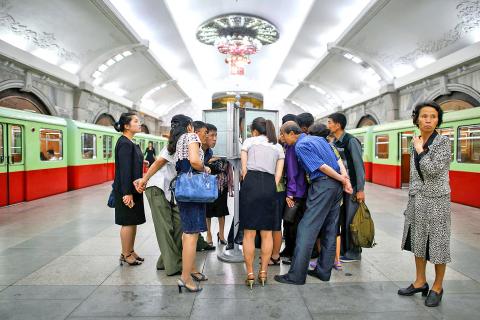A day after their historic summit, US President Donald Trump and North Korean leader Kim Jong-un returned to their respective strongholds, but to far different receptions.
In Pyongyang, Kim woke up yesterday morning to state media’s enthusiastic claims of a victorious meeting with the US president; photographs of him standing side-by-side with Trump on the world stage were splashed across newspapers.
Meanwhile, Trump faced questions about whether he gave away too much in return for far too little when he bestowed a new legitimacy on Kim’s rule and agreed, at Pyongyang’s request, to end war games with Seoul.

Photo: AFP
As US Secretary of State Mike Pompeo jetted to South Korea for follow-up talks, much of Asia was still trying to process the whirlwind events of the day before.
There were worries, especially in Tokyo and Seoul, about Trump agreeing to halt US military exercises with South Korea.
That concession appeared to catch the Pentagon and officials in Seoul off guard, and some South Koreans were alarmed.
Pompeo yesterday left Singapore on his way to Seoul, where he planned to meet privately in the evening with General Vincent Brooks, commander of US Forces Korea, and is to meet South Korean President Moon Jae-in this morning to discuss the summit.
Japanese Minister of Foreign Affairs Taro Kono is also heading to Seoul and is due to meet with Pompeo and his South Korean counterpart.
Pompeo then plans to fly to Beijing to update the Chinese government on the talks.
Trump on Twitter said that meeting meant “the World has taken a big step back from potential Nuclear catastrophe!”
“No more rocket launches, nuclear testing or research! The hostages are back home with their families. Thank you to Chairman Kim, our day together was historic!” he added.
Trump insisted that strong verification of denuclearization would be included in a final agreement, saying it was a detail his team would begin sorting out with the North Koreans next week.
The North yesterday suggested that Trump had moved away from his demand for complete denuclearization before US sanctions are removed.
The Korean Central News Agency said the leaders “shared recognition to the effect that it is important to abide by the principle of step-by-step and simultaneous action in achieving peace, stability and denuclearization of the Korean Peninsula.”
It also said that Trump had expressed his intention to lift sanctions “over a period of goodwill dialogue” and accepted an invitation from Kim to visit North Korea.
The White House declined to comment on the North Korean characterization of the deal.
In Japan, the prospect of canceled US-South Korean drills was met with concern.
“The US-South Korea joint exercises and US forces in South Korea play significant roles for the security in East Asia,” Japanese Minister of Defense Itsunori Onodera told reporters.
Japan wants to get further explanations from the US and South Korea on the issue, Japanese Chief Cabinet Secretary Yoshihide Suga said, declining to comment further.
Additional reporting by AFP

The Ministry of Foreign Affairs (MOFA) yesterday said it is closely monitoring developments in Venezuela, and would continue to cooperate with democratic allies and work together for regional and global security, stability, and prosperity. The remarks came after the US on Saturday launched a series of airstrikes in Venezuela and kidnapped Venezuelan President Nicolas Maduro, who was later flown to New York along with his wife. The pair face US charges related to drug trafficking and alleged cooperation with gangs designated as terrorist organizations. Maduro has denied the allegations. The ministry said that it is closely monitoring the political and economic situation

UNRELENTING: China attempted cyberattacks on Taiwan’s critical infrastructure 2.63 million times per day last year, up from 1.23 million in 2023, the NSB said China’s cyberarmy has long engaged in cyberattacks against Taiwan’s critical infrastructure, employing diverse and evolving tactics, the National Security Bureau (NSB) said yesterday, adding that cyberattacks on critical energy infrastructure last year increased 10-fold compared with the previous year. The NSB yesterday released a report titled Analysis on China’s Cyber Threats to Taiwan’s Critical Infrastructure in 2025, outlining the number of cyberattacks, major tactics and hacker groups. Taiwan’s national intelligence community identified a large number of cybersecurity incidents last year, the bureau said in a statement. China’s cyberarmy last year launched an average of 2.63 million intrusion attempts per day targeting Taiwan’s critical

‘SLICING METHOD’: In the event of a blockade, the China Coast Guard would intercept Taiwanese ships while its navy would seek to deter foreign intervention China’s military drills around Taiwan this week signaled potential strategies to cut the nation off from energy supplies and foreign military assistance, a US think tank report said. The Chinese People’s Liberation Army (PLA) conducted what it called “Justice Mission 2025” exercises from Monday to Tuesday in five maritime zones and airspace around Taiwan, calling them a warning to “Taiwanese independence” forces. In a report released on Wednesday, the Institute for the Study of War said the exercises effectively simulated blocking shipping routes to major port cities, including Kaohsiung, Keelung and Hualien. Taiwan would be highly vulnerable under such a blockade, because it

UNDER WAY: The contract for advanced sensor systems would be fulfilled in Florida, and is expected to be completed by June 2031, the Pentagon said Lockheed Martin has been given a contract involving foreign military sales to Taiwan to meet what Washington calls “an urgent operational need” of Taiwan’s air force, the Pentagon said on Wednesday. The contract has a ceiling value of US$328.5 million, with US$157.3 million in foreign military sales funds obligated at the time of award, the Pentagon said in a statement. “This contract provides for the procurement and delivery of 55 Infrared Search and Track Legion Enhanced Sensor Pods, processors, pod containers and processor containers required to meet the urgent operational need of the Taiwan air force,” it said. The contract’s work would be